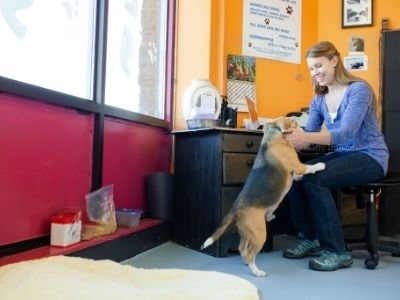You are an enthusiastic dog owner but, spending 24 hours with your pet dog is just not possible. While the idea of being with your pet dog 24 x 7 is optimistic, but, you also have other duties and work that are crucial for your survival. However, it’s unfair for the dog to go hours without your company.
So, question is, how do you address this situation, and Is there anything specific that you can do to resolve this? Well, the answer is yes! You can register your pet in a dog daycare. But, How much is dog daycare service charging in the UK? Let’s find out.
How Much Is Dog Daycare?
Dog daycare services can roughly cost £20-£30 per day and if you consider a monthly service pack, the prices can range between £500-600. The charges may vary as per the agency. In addition, these charges depend on the types of services and supplies they offer in their dog daycare.
So, what exactly a Dog Daycare provides?
The idea of Doggy Daycare is quite popular in the UK. In the past few years, many dog owners have begun to drop their pet dogs to daycare regularly. These centres provide different services – where taking care of the dog while the owner commutes to work is a top priority.
Further, these centres onboard dogs for short periods of time and provide care as per their needs. The dog owner drops their dog in the morning and then returns during the evening time to get their furry friend back.
Reasons why your furry friend needs a doggy daycare
In general, many citizens still leave their dogs at home alone without any company around. This is not good for dogs, especially the ones who are highly energetic in nature. It’s risky to leave them at home without someone monitoring them.
Further, the situation can get tricky as your dog may make a mess around the house. This happens because they are sensitive towards environmental circumstances and changes. The slightest of triggers such as a doorbell may change their behaviour.
When your dog stays alone at home, their behaviour may change significantly. For a few days, you won’t even observe these changes. But, you will gradually notice the signs. Following are some changes and reasons why your dog may need to go to a doggy daycare:
- Excessive barking: in your absence, your furry friend will bark at the smallest of noises. For instance, a doorbell, a knock on the door or any small thing falling because of a gust of the wind. Any sound will make them feel fearful in your absence and barking becomes their instinctive response.
- Destructive behaviour: your dog will show signs of destructive behaviour when they spend too much time alone indoors. They tend to break down stuff and chew on furniture, for instance, chewing on skirting boards. In addition, if your furry friend is highly intelligent and energetic, they will show such behaviour because they act on their impulse of using their energy through exercise.
- Health issues: your dog is likely to end up eating something unhealthy in your absence. In such cases, they might pick up some disease or worst, have a poisonous or allergic reaction which is fatal to their health condition.
- Separation anxiety: your dog will develop separation anxiety because of the crippling loneliness. They will feel not feel good in your absence, stop eating their food, stop interacting with you after your arrival, and at times get sick. In extreme conditions, your furry friend might end up getting depressed.
- Mental stimulation: dogs need puzzles and similar challenging activities to improve their cognitive function. Not receiving enough mental stimulation can cause them to break down, and feel depressed and they might stop responding to your commands.
Things To Look Out For In Dog Daycare

The UK government has precise guidelines that a dog daycare must follow. In the publication in which they mention these guidelines, there are clear instructions and rules that any daycare must see through for maintaining high standards and ensuring animal welfare.
Here are the general conditions that one must meet to operate their dog daycare centre:
#1 License display
A licensed copy must remain on display on the premises at all times. Whether near reception or near the entrance, people should easily see the details to get a sense of authenticity.
#2 Records
Along with the license, the dog daycare centre needs to maintain electronic records. These records should reflect at least 3 years of data from the date when records were made. If asked by an official, during the inspection, the license holder has to present these records.
#3 Precise numbering on license
Having precise numbering of the number of dogs allowed on the premises on the license is crucial. Also, if the license provides permission for having dogs, no other animals should get entry or remain near the premises.
The license should also indicate the maximum intake number i.e. the number of dogs that the centre can contain.
#4 Staffing
The centre must have a proper staff who can provide care and ensure the safety of the dogs. They must be well-trained. Here are some of the basic skills or training they must have:
- feeding and preparing food
- animal welfare, including identifying poor welfare
- understanding of animal behaviour
- animal handling
- cleanliness and hygiene
- preventing and controlling disease
- identifying sick or injured animals
- delivering first aid to sick or injured animals
#5 Suitable environment
The centre must have a proper environment setup that maintains hygiene and can meet every need of the dogs. So, a robust setup alongside safe and durable equipment is a sign of a good daycare centre.
In addition, the centre also needs to ensure that there are no sharp projections, edges, or such dangerous materials that can potentially injure the dog. Also, dogs are known to escape from places, and hence, it’s crucial to have escape-proof doors, windows, and gates.
#6 Diet
A proper quality diet must be offered to the dogs. The staff must also take care of their requirements and feed them accordingly. Again, it’s crucial to discuss the diet with the dog owner, because they may have certain allergies.
Further, the staff also needs to keep track of the frequency of feeding water and food items to different dogs.
#7 Training
The dog daycare facility must have a written programme that portrays its rich environment. They should include basic facilities such as – grooming, playing, and socialisation. In addition, the staff must also monitor the behaviour of the dogs and provide them with training accordingly.
The senior dogs should get specific attention and training from the staff members. No training method or equipment should harm any dog in any way.
#8 Emergency plan
The centre must have an emergency plan in place. The plan also needs acknowledgement from the local authorities. Staff members should know every detail of the plans and if necessary other people on the premises must also know the emergency plan.
These were some prominent aspects one should look for in a doggy daycare centre. You can refer to the government guidelines to know more about the rules of such daycare centres for dogs.
Different types of dog daycare
There are different types of dog daycare available in the UK. The type distinction is based on the services they provide and the method i.e. how they operate. Below are some of the types of dog daycare:
- Commercial Dog Daycare: these types of centres operate professionally and can accommodate at least 20-30 dogs at once within their premises. In addition, commercial dog daycare also incorporates both indoor and outdoor facilities. Dogs can easily roam around and play freely. If your dog is lucky you may end up finding a centre which also has doggy pools.
- In-house Dog Daycare: these daycare centres operate on a smaller level, meaning, they don’t accommodate large numbers. Generally, people who adore dogs, and have plenty of space around their backyard form an in-house daycare for them. However, this space is not big like the commercial dog daycare, so, don’t get surprised if you only see 5-10 dogs as a limit.
- Off-leash Hiking Dog Groups: these types of daycare are specifically providing services that match the needs and traits of highly active dogs. For instance, a small group of hyperactive dogs is taken on a hiking track for some adventure and off-leash exercise. The off-leash exercise takes about an hour and then the dogs are safely dropped off by the trainers.
Benefits Of Dog Daycare

There are ample benefits to doggy daycare. The most obvious benefit is that your dog doesn’t have to stay home alone. Here are some other benefits your furry friend may get while going to a doggy daycare:
- Socialisation
If your dog is in a slot where different owners are going to drop their dogs, then it is a good sign. Your dog will probably make some new friends or even form their own group. This will help improve their socialising skill and keep them engaged.
Further, this can also help in dealing with their anxiety issues. Once they form a group, you will see some behaviour changes as well. For instance, they will not act on their impulses or be aggressive because they learn how to control such instincts while staying in their group.
- Routine
While dogs may not have a working routine as we do, they do need an organised one to remain in good health condition. Their routine mainly involves a loo break, meal time, and a walking exercise. So, when you are in the office it gets difficult for them to get this routine.
Doggy daycare will make sure they outline a routine and train your dog accordingly. In fact, the staff members at these centres are trained so well that they will make a routine which suit’s your dog the best. This routine can turn out well for you as well. Because you get to spend time with your furry friend once you are home and there is no need for you to take them for a walk.
- Less destructive behaviour
Dogs tend to get aggressive and start exhibiting destructive behaviour in your absence. For instance, they’ll start chewing skirting boards, shoes, and other things around the house. This happens because of boredom and separation anxiety.
In a dog daycare facility, they will not feel this boredom or anxiety because they will get enough exercise during the day. This minimises the scope for them to show aggressive behaviour. You will see them fall asleep after you get back home because they are tired.
Benefits to the owner
In the previous section we saw some of the main benefits for a dog in a dog daycare centre, but, how does enrolling your furry friend benefit you? Let’s see:
- Less worrying
Enrolling the dog in daycare gives you a sense of relief. You stop worrying about your furry friend while you are out working.
- No additional exercise
Once your dog is back home, you don’t need to execute any exercise drills or take them for a walk. They already have that at the centre and also, their energy is worn out after spending the whole day there.
- Fewer expenses on equipment
The daycare centre has all the necessary equipment and supplies to keep your dog engaged. From toys to different equipment allowing your furry friend to run, jump or play around, they have it all. Hence, you don’t have to spend extra money on such types of equipment.
Disadvantages or risks of a dog going to a daycare centre
No doubt that there are many advantages for a dog and its owner while going to daycare, but there are some risks/disadvantages associated as well. Following are some of the disadvantages you need to keep in mind:
- Negative behaviour – dogs’ personalities vary and it’s possible that the new experience of the daycare centre can have an adverse effect. For instance, meeting new people and fellow canines can make them more anxious. So, instead of socialising they can start curating negative behaviour and risk becoming aggressive.
- Lack of care – you will always feel anxiety regarding your dog’s well-being while they are in a doggy daycare centre. This is obvious because no trainer regardless of how well-trained they are will take care of the dog as you do. Lack of personalised care can cause some behavioural issues in the dog.
- Risk of negligence – there are many dogs in a daycare, and a staff member may neglect your dog. Also, if there is an escalation in a particular situation, for instance, dogs fighting, your dog may suffer injuries if the staff is neglecting the situation.
- Bonding – the bond between you and your dog is likely to get affected, especially if your furry friend spends more time at such caretaking facilities.
- Costly – while there are many services offered in a dog daycare centre, they charge hefty amounts as well. The charges can elevate if your furry friend has some specific needs or issues that need special attention.
Preparing Your Dog For Dog Daycare
You cannot randomly decide to drop your dog at a dog daycare centre. Yes, the concept of a doggy daycare centre is to deal with separation anxiety and other issues but, when you will drop your dog off for the first time, they will find some difficulty adjusting as the territory is new for them. Things can go sideways if you don’t mentally prepare your dog.

Here are some basic tips you can follow for mentally preparing your furry friend for a dog daycare:
- Socialise your dog – even though your canine friend will socialise in a daycare centre, you need to train them to socialise before the actual visit. Take them to the park or meet other fellow dog owners. Conduct a playing session and if your dog responds well, they will get along with other dogs at the centre.
- Crate train the dog – many daycare centres use crates for giving rest to dogs. So, it’s important to crate-train your furry friend so the transition is easy.
- Pre-visit the centre – this is the best way to mentally prepare your dog for a daycare facility. Once you visit the centre before actually beginning to drop them off on regular basis, it can do wonders. Your dog gets used to the surrounding environment and smells. So, when they start visiting the place they won’t panic.
- Obedience – your dog may get aggressive or express their excitement in different ways. While you are aware of the triggers and circumstances that lead to such behaviours, the trainers at the centres are not. So, you need to train them to obey commands from a different person.
FAQs
How much is doggie day care license in the UK?
The application fee is roughly £173, and a three-year license fee costs about £365. However, the long license i.e. three years period is only given when an owner of the centre meets higher standards and also follows the government guidelines to start a doggie daycare.
How much does dog babysitting cost in London?
In comparison with other areas in the UK, prices of dog babysitting in London are high. So, if you hire a dog babysitter in London you should anticipate a minimum charge of £20 and the maximum pricing goes beyond £80. So, it is impossible to cut costs while you look for doggy care services.
Can I get someone to look after my dog?
Yes, you can! If for some reason you can’t get your family member or friend to look after your dog, you can hire a dog babysitter. They take care of the dog and this is the best way to ensure your pet isn’t left unattended. You can also consider a dog daycare if you find suitable services that can engage your dog and keep them happy throughout the day.
How often can my dog go to doggy daycare?
Normally, a dog can go to daycare on regular basis but, it’s better if you restrict the visits to 2-3 times a week. The reason is simple, you create a dependency, meaning, your dog will start considering dog daycare a place of receiving exercises and mental stimulation. This can create issues in the long run as they won’t behave nicely at home. So, make sure you minimise the visits to the doggie day care.
How Much Is a Dog Daycare? – Conclusion
The price of a dog daycare varies as per the service and the type. There are benefits to leveraging the dog daycare centres but, making it a routine for the dog can prove costly. Your dog may lose the connection with your furry friend. They may start thinking of the dog daycare centre as their home.
Thus, when you decide on taking your dog to a dog daycare centre, make sure you don’t take them more than 3 days per week. This will ensure your bond remains intact and you can cut some costs as well.



